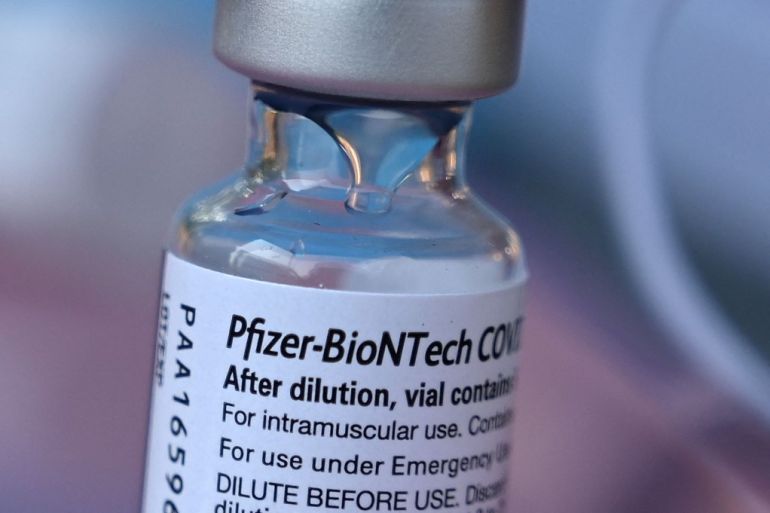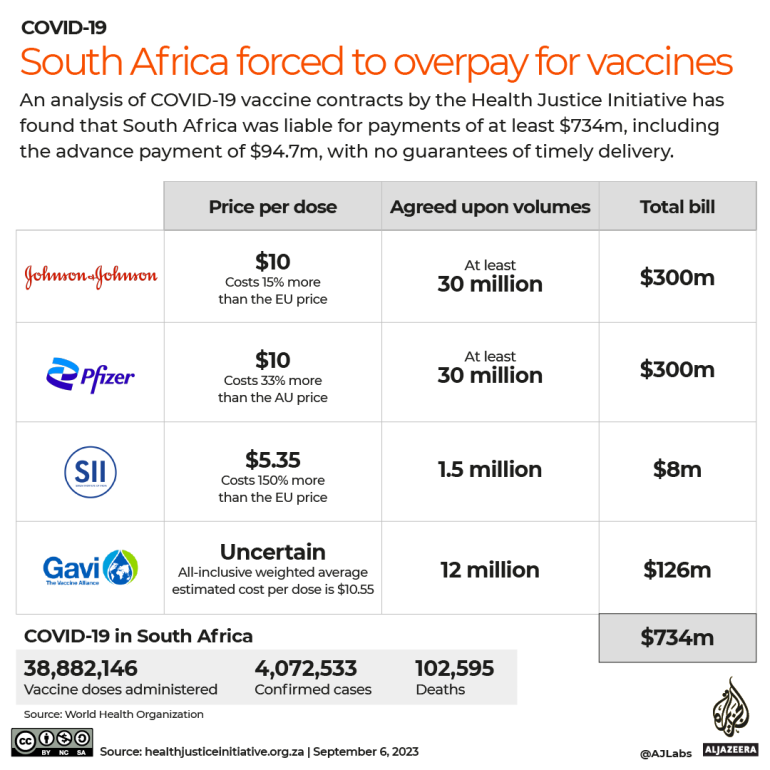CRIMINAL CAPITALI$M BIG PHARMA
South Africa ‘held to ransom’ by big pharma, overcharged for COVID vaccinesJ&J, Pfizer charged South Africa between 15 and 33 percent more for COVID vaccine doses, contracts reveal.

A vial of Pfizer-BioNTech's COVID-19 vaccine
[File: Robyn Beck/AFP]
By Sumayya Ismail
Published On 6 Sep 2023
Johannesburg, South Africa – Big pharmaceutical companies “bullied” South Africa into signing unfair agreements that forced the country to overpay for COVID-19 vaccines compared with Western nations, according to a nonprofit that lobbied for the details to be released.
The details were revealed on Tuesday in an analysis by the Health Justice Initiative (HJI), a South African NGO campaigning against public health inequality after it won a court bid last month to get the government to release its contracts.
During the height of the pandemic, Johnson & Johnson (J&J) charged South Africa 15 percent more per dose of its COVID vaccine than it charged the European Union, while Pfizer-BioNTech charged South Africa nearly 33 percent more than it reportedly charged the African Union, according to vaccine contracts between the pharmaceutical companies and the government.
“In simple terms, Big Pharma bullied South Africa into these conditions,” HJI director Fatima Hassan told Al Jazeera. “Amid a deadly pandemic, when scarce vaccines were only going to the richest countries, the companies exploited our desperation.”
“Put simply, pharmaceutical companies held us to ransom,” a HJI press release stressed.

(Al Jazeera)
South Africa was liable for payments of at least $734m, HJI said, including advance payments of almost $95m, with no guarantees of timely delivery.
“I wouldn’t say we were bullied, but we were in a catch-22 situation to save lives of South Africans against all odds,” Foster Mohale, spokesperson for South Africa’s Department of Health, told Al Jazeera. “The Department entered into these agreements to secure vaccine doses to protect the lives of South Africans against the deadly virus which claimed more than hundred thousand lives in South Africa.”
Hassan told Al Jazeera. “We hope that more countries will publish their contracts with Big Pharma, so that the world can see how the industry really conducts business.”
‘Pharmaceutical bullying’
The analysis of the documents also showed unfair practices by the Serum Institute of India – which charged South Africa 2.5 times more for a generic version of the Oxford-AstraZeneca vaccine than the United Kingdom – and the Global Alliance for Vaccines and Immunization (Gavi), which is meant to improve equitable access to vaccines.
Gavi gave no guarantees to South Africa about the number of doses it would receive, or the delivery date, HJI said, but South Africa remained liable to pay for everything it ordered – even after it had to order more doses directly from pharmaceutical companies when Gavi failed to deliver.
The HJI criticised “the pernicious nature of pharmaceutical bullying and Gavi’s heavy-handedness”, saying that “the terms and conditions are overwhelmingly one-sided and favour multinational corporations”.
It said the “most egregious example” of this was J&J, which traded supplies under “extractionist terms and conditions”. J&J charged South Africa $10 per dose while the EU reportedly paid $8.50, and non-profits paid $7.50.
However, Kafi Mojapelo, a spokesperson for J&J, told Al Jazeera the number was “incorrect” and “no customer paid more than $7.50 for our single-dose vaccine”.
“Johnson & Johnson … supplied our vaccine to South Africa at our final global price of $7.50 per dose, transferred our technology to Aspen Pharmacare in Gqeberha to enable the local fill and finish of the Johnson & Johnson COVID-19 vaccine and later enabled Aspen to manufacture, market and sell its own COVID-19 vaccine, ‘Aspenovax’,” a statement from the company said.
On Pfizer’s pricing, HJI said the company was “equally problematic” and “extracted over the top concessions” from South Africa, which had to pay it $40m in advance, half of it non-refundable. Pfizer also charged $10 a dose, but it charged the AU $6.75. The company is yet to respond to Al Jazeera’s requests for comment on the matter.
“It is unconscionable, imperial and unethical,” HJI said.
The contracts also stipulated that South Africa needed to get permission from the pharmaceutical companies if it wanted to donate or sell doses it had already paid for.
“Frankly, in a global pandemic this is paternalistic and imperialist, harms public health programming and deliberately reduces the autonomy of African states,” HJI said.
It highlighted the “deference to and fear of pharmaceutical power” and said that a regional and global solution as well as a “legally binding international agreement” was needed to solve the problem before future pandemics.
South Africa was liable for payments of at least $734m, HJI said, including advance payments of almost $95m, with no guarantees of timely delivery.
“I wouldn’t say we were bullied, but we were in a catch-22 situation to save lives of South Africans against all odds,” Foster Mohale, spokesperson for South Africa’s Department of Health, told Al Jazeera. “The Department entered into these agreements to secure vaccine doses to protect the lives of South Africans against the deadly virus which claimed more than hundred thousand lives in South Africa.”
Hassan told Al Jazeera. “We hope that more countries will publish their contracts with Big Pharma, so that the world can see how the industry really conducts business.”
‘Pharmaceutical bullying’
The analysis of the documents also showed unfair practices by the Serum Institute of India – which charged South Africa 2.5 times more for a generic version of the Oxford-AstraZeneca vaccine than the United Kingdom – and the Global Alliance for Vaccines and Immunization (Gavi), which is meant to improve equitable access to vaccines.
Gavi gave no guarantees to South Africa about the number of doses it would receive, or the delivery date, HJI said, but South Africa remained liable to pay for everything it ordered – even after it had to order more doses directly from pharmaceutical companies when Gavi failed to deliver.
The HJI criticised “the pernicious nature of pharmaceutical bullying and Gavi’s heavy-handedness”, saying that “the terms and conditions are overwhelmingly one-sided and favour multinational corporations”.
It said the “most egregious example” of this was J&J, which traded supplies under “extractionist terms and conditions”. J&J charged South Africa $10 per dose while the EU reportedly paid $8.50, and non-profits paid $7.50.
However, Kafi Mojapelo, a spokesperson for J&J, told Al Jazeera the number was “incorrect” and “no customer paid more than $7.50 for our single-dose vaccine”.
“Johnson & Johnson … supplied our vaccine to South Africa at our final global price of $7.50 per dose, transferred our technology to Aspen Pharmacare in Gqeberha to enable the local fill and finish of the Johnson & Johnson COVID-19 vaccine and later enabled Aspen to manufacture, market and sell its own COVID-19 vaccine, ‘Aspenovax’,” a statement from the company said.
On Pfizer’s pricing, HJI said the company was “equally problematic” and “extracted over the top concessions” from South Africa, which had to pay it $40m in advance, half of it non-refundable. Pfizer also charged $10 a dose, but it charged the AU $6.75. The company is yet to respond to Al Jazeera’s requests for comment on the matter.
“It is unconscionable, imperial and unethical,” HJI said.
The contracts also stipulated that South Africa needed to get permission from the pharmaceutical companies if it wanted to donate or sell doses it had already paid for.
“Frankly, in a global pandemic this is paternalistic and imperialist, harms public health programming and deliberately reduces the autonomy of African states,” HJI said.
It highlighted the “deference to and fear of pharmaceutical power” and said that a regional and global solution as well as a “legally binding international agreement” was needed to solve the problem before future pandemics.
No comments:
Post a Comment